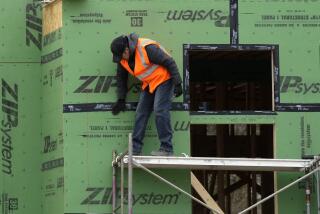U.S. new-home sales rise more than forecast
- Share via
WASHINGTON — Sales of new homes bounced back in November and have posted increases in three of the last four months, a sign that this year’s drop in housing may be leveling off.
Sales of new single-family homes rose 3.4% last month to an annual rate of 1.05 million units from an upwardly revised 1.01 million units in October, the Commerce Department said Wednesday. It also revised August and September sales higher.
Wall Street analysts had expected sales to rise to a 1.02-million rate in November from the previously reported October pace of 1 million units.
Sales were up in most of the country except the South, where they fell 9.3%. In the West, which includes California, new-home sales rose 19% from October.
But overall sales dropped 15.3% from a year earlier, the data showed.
Still, Alex Beuzelin, senior market analyst at Ruesch International in Washington, said the report provided “further evidence to support the view that the worst of the housing downturn may have passed.”
The supply of homes available for sale, measured at the current sales pace, fell to 6.3 months’ worth in November from 6.7 months’ worth in October. A total of 545,000 homes were on the market at the end of November, off slightly from October.
A glut of unsold homes had led builders to scale back construction, weighing on U.S. economic growth. The economy expanded at a tepid 2% annual rate in the third quarter as home building saw its deepest downturn in 15 years.
Although some analysts saw the data as a sign of growing health in the housing sector, others urged caution in light of another report that showed a slip in mortgage applications.
The Mortgage Bankers Assn. said Wednesday that mortgage applications fell last week by 14.2% to their lowest level since early August.
“You still have a significant supply, and there’s still a long way for that to work through the market,” said Benjamin Halliburton, managing director of Traditional Capital Management in Summit, N.J.
“We’re definitely not out of the woods,” he said.
The housing slowdown has had a major effect on the overall economy, shaving 1.2 percentage points from growth in the July-to-September period and probably an equal amount from growth in the current quarter.
There had been fears that the possible bursting of the real estate bubble might have a similar effect as the bursting of the stock market bubble did in 2001, restraining consumer spending so much that it could push the country into a recession.
Analysts, however, now expect the economy to avoid an outright downturn, although they said the weakness from housing would probably depress overall growth through the first half of next year.
“The U.S. economy is still far from breaking free of the shackles of the housing recession despite this bit of holiday cheer,” said Michael Gregory, senior economist at BMO Capital Markets.
U.S. retailers’ sales growth during the holiday season may fall short of forecasts because the slowdown in housing and higher energy costs curbed consumer spending.
The International Council of Shopping Centers and UBS Securities said the gain in U.S. chain-store sales slowed last week to 1.7% above year-earlier levels. It was the weakest year-over-year reading since Feb. 12, 2005.
Also Wednesday, Redbook Research said chain-store sales were down 1.6% this month through Dec. 23 compared with the same period in November.
“The Christmas week was on target for most, but no better,” Redbook Research said.
More to Read
Inside the business of entertainment
The Wide Shot brings you news, analysis and insights on everything from streaming wars to production — and what it all means for the future.
You may occasionally receive promotional content from the Los Angeles Times.










